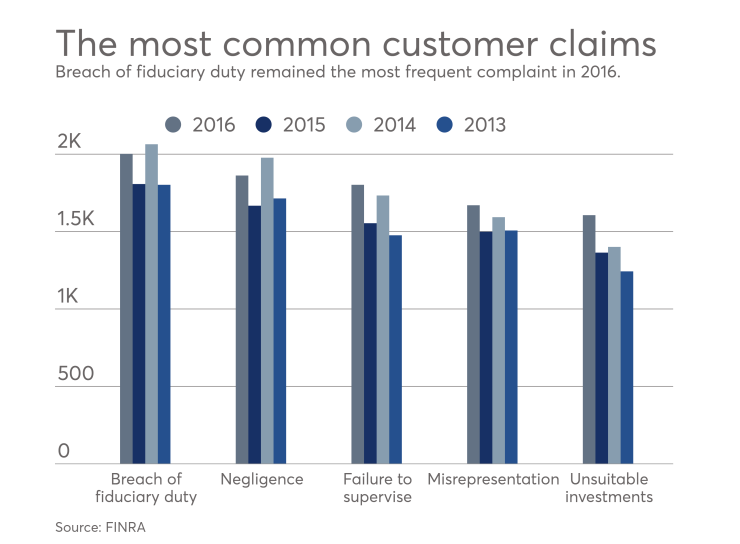FINRA wants to tighten the rules about who can represent clients in its private arbitration forum.
To that end, it has asked the SEC to approve a new rule that would forbid so called non-attorney representatives — or NARs — from taking client cases for compensation.
The move follows calls from investor advocates, who have been pushing the self-regulator to make such a reform. Former brokers who had been banned from the financial services industry, including some with criminal pasts, have been representing investors for years, according to a study by the Public Investors Arbitration Bar Association.

People who are not attorneys may still represent investors pro bono and investors may also represent themselves, according to a FINRA spokeswoman.
"It's a really good development and something that needed to be done," says Andrew Stoltmann, who coauthored the PIABA study. "These [non-attorneys] have been causing chaos for decades and taking advantage of investors a second time. FINRA deserves credit for seeking to have them banned."
-
Critics say the practice of using non-attorneys, some with criminal records, to represent investors often makes their problems worse. Advocates say it's cheaper.
January 4 -
A group of attorneys raises concerns about extensive industry ties among FINRA’s public board members.
November 15 -
In recruiting more women and minorities, the regulator aims to reshape its homogeneous roster of arbitrators.
September 21 -
The regulator skips creating a fund for investors with unpaid arbitration claims, despite raising hopes that it might.
May 12
Stoltmann, PIABA's immediate past president, conducted the study with fellow PIABA member, David Neuman. Both are attorneys who represent investors in FINRA arbitration.
The proposed rule change also follows
The SEC, which now must decide whether to accept or reject the request, did not respond to a request for comment. FINRA sent the proposal to the commission last month following its regular board meeting.
During the meeting, "we talked about non-attorney representatives," said FINRA Director of Dispute Resolution Rick Berry in a video posted to the regulator’s website. "And the committee approved banning compensated non-attorney representatives in the arbitration forum."
FINRA itself declined to comment on the rule proposal.
Some NARs have made a practice of aggressively marketing themselves to investors and charging them high fees both upfront and as a percentage of any recovered losses, according to the PIABA study and Financial Planning's investigation.
While attorneys are subject to stringent ethical and professional requirements, non-attorney representatives can operate more freely, for example, by cold-calling clients, a practice forbidden for attorneys.
Some ex-brokers with long disciplinary histories have built second careers taking cases at lower rates than lawyers charge. Although FINRA has explicitly forbidden banned brokers from representing investors for some time, at least one continues to handle high caseloads, and others offer their services through proxies, the PIABA study found.
The rule change would effectively close that loophole and prevent brokers who ran afoul of securities regulators from taking investor cases by making them ineligible to serve in that capacity if they are not attorneys.
For some time, "we've been hearing horror stories about some investors paying $20,000 nonrefundable retainers just to have somebody review their case," study coauthor Neuman says. "And then those people, who already paid the retainers, either get represented by the NAR or get farmed out to an attorney who handled the case."
"That's a lot of money to put up," he adds, "and then still get dinged by a … contingency fee on the backend." Some charge more than 30% of any amount recovered, he says.
Neuman predicts it still could take up to a year for the SEC to approve the rule — and perhaps longer for it to be implemented.
Still, given the longstanding nature of the problem, he thinks FINRA acted decisively in response to concerns about the issue.
"I'm surprised it's gone this relatively quickly," he says.





